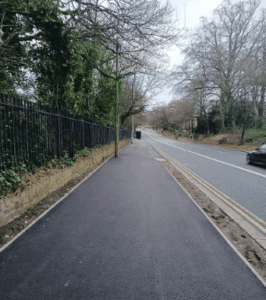Fix a failing planning system to decarbonise transport and improve health say leading transport professional and campaign bodies.
In a rare collaboration, the Transport Planning Society, Chartered Institution of Highways and Transportation, Transport for New Homes, Sustrans, Living Streets and CPRE the countryside charity have joined forces.
Together they have submitted a joint response to the Levelling up and Regeneration Bill (LURB) on the Draft National Planning Policy Framework (NPPF). Alongside their response they have written a letter to the Secretary of State for Levelling Up, Housing and Communities to seek a meeting.
Whilst pleased that the NPPF is being revised, they are concerned the Draft NPPF misses a vital opportunity to reduce transport emissions. The group are calling on the Government to amend national planning policy to better integrate spatial planning with transport, to help meet Net Zero targets and improve health and wellbeing.
Neil Johnstone, President of the Chartered Institution of Highways and Transportation (CIHT), explains “Poor location of new developments to existing transport links creates a barrier for people to using sustainable transport. If we want more people to choose sustainable transport options, sustainable transport provision needs to be included in every stage of planning.”
Currently the Draft NPPF allows for poorly located, car dependent new housing developments. Instead, the collaboration of organisations is calling for the Draft NPPF to ensure all new housing developments can prove access to sustainable transport links. This includes access to regular public transport services and high-quality walking, wheeling and cycling routes.
Mark Frost, Chair of the Transport Planning Society (TPS), says “As the transport sector is now the largest single contributor to carbon emissions in the UK, considering how planning processes can support reducing those emission is vital. Doing so would ensure more people have a genuine choice in how they move around, helping increase the take up of sustainable transport modes and is essential if the UK is to meet its legal obligations to tackle the climate emergency.”
The leading industry groups are acting now to pick up the pace needed to meet our net zero targets, to reduce car dependency and to ensure new housing developments are better located to transport links.
Jenny Raggett of Transport for New Homes explains, “The planning system directs thousands of new homes to places where public transport is very hard to provide. The choice of accommodation for people who can’t or don’t want to drive is then limited. We need to re-think the way we plan, with modern high quality and frequent public transport as an essential part of truly sustainable planning and a lower carbon future.”
Joining the call for greater integration of spatial planning, transport and decarbonisation in planning policy, Tom Fyans, interim CEO of CPRE the countryside charity, says “The planning system is one of the most powerful levers the government can pull to tackle the climate emergency. Using planning to integrate top class public transport into our communities is a crucial part of achieving net zero.
“Local authorities need to radically reduce our dependence on cars. They can do this by planning for thriving neighbourhoods that place housing, amenities and workplaces within walking distance of each other. The health of people and the planet goes hand in hand and the National Planning Policy Framework is a rare opportunity to prioritise this.”
This comes after new YouGov polling out this week shows that 62% of people would support their local authority adopting a target to make their area a 15-minute neighbourhood.
Rachel White, Head of Public Affairs at Sustrans, explains “Until we stop building homes that embed car dependency, and instead make it convenient for people to walk, wheel, cycle, or use public transport, we will continue to undermine our shared path to net zero. The Government must seize the opportunities of the Levelling Up and Regeneration Bill and the NPPF review to build healthier, happier, greener communities.”
Stephen Edwards, CEO of Living Streets, says “We are delighted to join this response to highlight the urgent need to amend the Draft NPPF and join planning for new developments with sustainable transport. With the public facing increasing pressures to move away from private cars onto public transport and active travel, we need to ensure our housing system best supports this transition for both people and the planet.”
You can read their letter to the Secretary of State here.
























